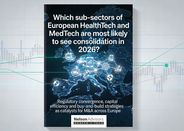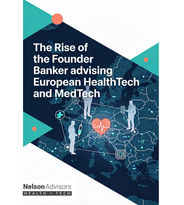Venture Capital's Evolving Playbook: Lessons from HealthTech in the 2025 Public Markets
- Lloyd Price
- Jul 1, 2025
- 15 min read

I. Executive Summary
In 2025, Venture Capitalists (VCs) have significantly recalibrated their investment strategies within the HealthTech sector, largely influenced by a maturing public market and evolving macroeconomic conditions. The primary observations for VCs include a critical pivot from prioritising "growth-at-all-costs" to demanding demonstrable profitability and sustainable business models. A paramount understanding is the essential role of Artificial Intelligence (AI) that offers clear, quantifiable return on investment (ROI) in enhancing operational efficiency and improving patient outcomes.
Furthermore, the public market's initial public offering (IPO) window is perceived as selectively open and highly discerning, necessitating that companies demonstrate financial maturity prior to listing. This environment underscores the vital importance of robust regulatory compliance and scalable infrastructure as foundational elements for success. Consequently, VCs are increasingly relying on diversified exit strategies, particularly mergers and acquisitions (M&A) and private equity buyouts, to ensure liquidity amidst a cautious public market.
While private HealthTech funding has experienced a notable surge, the broader public healthcare sector has faced more subdued returns, indicating a highly selective market. AI-driven solutions, particularly those addressing B2B operational efficiencies and personalised care, continue to attract substantial capital. The sector remains rich with opportunity, propelled by an aging global population and the escalating burden of chronic diseases. However, long-term success hinges on companies demonstrating tangible value, operational excellence, and strategic foresight in a complex regulatory and economic landscape.
II. The 2025 HealthTech Public Market Landscape
Overall Market Sentiment and Growth Trajectory
The digital health sector has commenced 2025 with a discernible positive momentum, signalling a rebound in activity following a period of downturn. Projections for the digital health market indicate substantial growth, with its valuation anticipated to rise from USD 312.9 billion in 2024 to USD 2.19 trillion by 2034, representing a robust Compound Annual Growth Rate (CAGR) of 21.2% from 2025 to 2034.2 Another estimate corroborates this expansion, forecasting growth from $271.53 billion in 2024 to $319.16 billion in 2025 at a 17.5% CAGR, further expanding to $595.47 billion by 2029.
Despite this strong optimism and growth forecast within the private digital health domain, the broader Healthcare sector within the S&P 500 has experienced "lackluster results" in recent years, a trend that persisted into 2025 with a 4.1% retreat as of May 30. Public healthtech stocks have also been noted as generally "underperforming". This apparent contradiction between booming private market funding and the overall subdued performance of the broader public healthcare sector reveals a critical understanding for VCs: the public market is highly discerning. While capital is readily flowing into innovative HealthTech ventures in the private domain, public investors are exercising greater caution and selectivity. This suggests that strong private funding does not automatically guarantee public market success, and public investors are scrutinising fundamentals, profitability, and sustainable business models more rigorously than during the 2021 boom. Public market success is increasingly reserved for a select few HealthTech companies that demonstrate not just innovation, but also a robust business model, a clear path to profitability, and resilience against broader market headwinds. This dynamic compels VCs to guide their portfolio companies toward financial maturity and demonstrable value before considering an IPO.
Key Drivers Influencing Market Expansion
Several factors are accelerating the expansion of the HealthTech market in 2025:
Accelerated Digital Transformation: Digital transformation is identified as the most impactful issue for global health systems in 2025, with approximately 90% of C-suite executives anticipating its acceleration.This urgency stems from the healthcare industry significantly lagging behind other sectors like retail and finance in adopting digital technologies. Many health systems still rely on outdated processes, making them prime candidates for digital upgrades.
Artificial Intelligence (AI) Integration: AI is emerging as a powerful force poised to revolutionise operational efficiencies, patient care, and profitability across the healthcare industry. It is widely regarded as a "game changer" for reshaping healthcare at an astonishing pace, with the AI healthcare market alone projected to reach $187.7 billion by 2030, growing at nearly 40% annually.
Shifting Consumer Preferences and Proactive Care: A significant cultural shift is underway, transitioning from reactive care to a proactive and preventive approach to health. This is fuelled by a growing demand for direct access to health data and preventive monitoring solutions. Consequently, more consumers are willing to pay out-of-pocket for faster, more personalised alternatives that offer health data points and biological insights for early disease detection and risk assessment.
Rising Chronic Disease Burden and Aging Population: The increasing prevalence of chronic diseases globally, such as cancer and diabetes, coupled with an aging population, serves as a fundamental demographic driver fuelling consistent demand across the diverse sub-groups of the healthcare sector. For instance, cardiovascular diseases cause approximately 17.9 million deaths annually, spurring the need for continuous monitoring services and digital health solutions.
Focus on Operational Efficiencies: A substantial majority (over 70%) of C-suite executives across key global markets, including Australia, Canada, Germany, the Netherlands, and the United Kingdom, have identified improving operational efficiencies and productivity gains as top priorities for their organisations in 2025. This focus is driven by constrained budgets, ongoing staff shortages, and clinician burnout.
Overview of Notable HealthTech IPOs and Public Market Performance in H1 2025
While public market volatility previously stalled the IPO window for many HealthTech companies , there are clear indications of a selective reopening in 2025. The US IPO market experienced a 55% uptick in the number of deals in Q1 2025, with healthcare and technology sectors leading the activity.
Several HealthTech companies have successfully completed Initial Public Offerings (IPOs) in the first half of 2025, demonstrating the market's receptiveness to specific, well-positioned firms. These include Hinge Health, which raised $437.3 million; Omada Health, which raised $120 million after operating privately for 14 years; and Caris Life Sciences, an AI-driven precision medicine company, which raised $494 million.13 Other notable IPOs include Wellgistics Health, integrating digital health technology and pharmacy services, and Kestra Medical Technologies, focusing on wearable cardiovascular devices.
Individual public HealthTech companies are also showing signs of a strong rebound or positive performance in 2025. Tempus AI's share price, for instance, surged over 58% in a single week (as of January 23) following the launch of its new AI-powered health app, "Olivia". Elevance Health's share price started 2025 positively, up over 9%. Health Catalyst, despite an early 18% decline, has Wall Street price targets indicating a substantial 59% upside potential, driven by its next-gen Ignite platform. Some of the best-performing healthcare stocks in June 2025, often clinical-stage pharmaceutical firms, exhibited exceptionally high 30-day returns, such as Liminatus Pharma (+374.0%) and UroGen Pharma (+247.2%). It is worth noting that most of these high-return companies do not yet have a P/E ratio, which is typical for pre-revenue or consistently loss-reporting firms focused on product development rather than immediate profitability.
The conflicting information regarding the IPO window, some sources indicating it is "stalled" while others point to a significant "uptick" and successful H1 2025 IPOs, indicates that while the market is not fully "open" as it was during the 2021 boom, it is accessible for a select group of companies. VCs are observing that this reopening is highly discerning, demanding "solid business and [profit and loss]" and a clear "trade-off between growth and profitability". This implies that VCs are now preparing their portfolio companies for a more rigorous public market scrutiny, emphasising financial maturity and proven business models alongside innovation. The era where "doors were too wide open" for digital health companies to go public, leading to subsequent underperformance, has ended.
Table 1: Digital Health Market Size and Growth Projections (2024-2034)
Metric | Value (2024) | Value (2025) | Value (2034) | CAGR (2025-2034) |
Digital Health Market Value | $312.9 billion | $387.8 billion | $2.19 trillion | 21.2% |
Digital Health Market Value (Alternative) | $271.53 billion | $319.16 billion | $595.47 billion (2029) | 17.5% (2024-2033) |
III. Venture Capital Investment Trends in HealthTech (2025)
Resurgence and Volume of HealthTech VC Funding in Q1 2025
The first quarter of 2025 has witnessed a significant resurgence in HealthTech venture capital funding. Healthtech VC funding increased by 30.4% in Q1 2025, reaching a total of $3.5 billion across 185 deals. Digital health funding, a key component of HealthTech, experienced an even more impressive surge of 47% in Q1 2025. This positive momentum is reflected in industry sentiment: a survey of 103 senior leaders from digital health companies indicated that 81% hold a positive or cautiously optimistic outlook on investment prospects for 2025, with a high percentage (79%) planning to seek new investment capital within the next 12 months. This strong start to the year suggests a potential bounce-back for startups in the sector.
Strategic Shift: Fewer, Larger Deals and Emphasis on Quality Over Quantity
The overall investment landscape in 2025 is characterised by a strategic shift towards fewer, but significantly larger deals, with a pronounced focus on scalable, data-driven solutions. This represents a departure from earlier periods where rapid growth, even at the expense of profitability, was often the primary metric for investment.
Within the biotech sector, there is a clear and deliberate emphasis on "quality over quantity." VCs are increasingly prioritising companies that possess validated science, strong biomarker evidence, and well-defined regulatory strategies, rather than distributing funds across numerous speculative ventures. A notable trend is the increase in average deal sizes for early-stage biotech startups. While the sheer number of deals has slightly decreased, the average investment per round has grown, indicating a preference for making larger, more impactful bets on promising programs. This shift is partly driven by the imperative to de-risk investments through mid-stage clinical validation, especially as VCs seek near-term exits amidst a cautious IPO market.This strategic pivot aligns with a broader market correction where VCs are actively preferring stronger, more profitable startups, signalling a departure from the "growth-at-all-costs" mentality that characterised previous periods.
This observed shift towards "fewer, larger deals" and a strong emphasis on "quality over quantity" indicates that VCs are evolving into more strategic architects of their HealthTech portfolios. They are learning that deep due diligence, a clear and validated path to profitability, and robust business fundamentals are more critical than broad, speculative investments, especially given the challenging macroeconomic environment. This means VCs are actively shaping companies for long-term viability and public market readiness, not merely acting as capital providers for rapid growth. They are compelled to become more involved partners, guiding companies to de-risk investments through rigorous clinical validation and a laser focus on profitability from earlier stages. This transforms their role from pure financiers to strategic collaborators.
Dominance of AI-Powered Solutions and B2B Tools in Funding Rounds
AI-powered innovation has emerged as the dominant force in the healthcare investment landscape, driving the majority of funding rounds observed in the first half of 2025. AI startups specifically within healthcare secured a record-breaking $32.9 billion in funding over the first five months of 2025, accounting for a substantial 58% of global VC investments in Q1.10 The resurgence in funding was primarily driven by investments in B2B AI tools and consumer-facing health platforms, with Q1 2025 alone witnessing six deals exceeding $100 million.
"Megarounds" are a defining feature of AI healthcare investments, with $2.5 billion raised across 11 deals in Q1, eight of which were specifically in AI health applications. Concrete examples of significant AI-driven investments highlight this trend:
Persivia secured $107 million for AI solutions designed to enhance operational efficiency and optimise patient management across healthcare systems.
Plenful raised $50 million in Series B funding for its AI workflow automation platform, which handles disparate workflows to reduce errors and streamline operations.
Healthee secured $50 million in Series B funding to expand its AI-powered tools for navigating complex health benefits.
Clarium raised $27 million in Series A funding for its AI technology that mitigates economic and environmental uncertainty in healthcare supply chains.
Ascertain raised $10 million in Series A funding for its Agentic AI technology that automates time-consuming workflows for case managers.
AI's proven ability to significantly slash R&D timelines (eg. Insilico Medicine reduced drug discovery timelines by 60%) is a major and compelling draw for investors, highlighting its transformative impact on efficiency. The overwhelming focus on AI, particularly in B2B tools and workflow automation, highlights a key observation: VCs are prioritising solutions that directly address the immediate, pressing needs of healthcare systems. These needs include improving efficiency, reducing operational costs, and alleviating administrative burdens.This underscores that the most valuable AI in HealthTech is that which solves concrete operational pain points, directly contributing to the profitability metrics that public markets now demand.
The Role of Angel Investors in Early-Stage HealthTech Innovation
Healthtech has emerged as a particularly attractive hotspot for angel investors in 2025, with a notable 54% expressing strong interest in this sector due to its potential for both high financial returns and significant societal impact. Unlike VCs who often focus on later-stage investments with larger ticket sizes, angel investors are increasingly stepping in to bridge the critical early-stage funding gap for nascent healthtech startups, particularly in areas such as telemedicine, wearables, and digital therapeutics. This trend is vital as many healthtech ventures traditionally struggle to navigate the "valley of death" due to the deep sector-specific knowledge required for investment decisions and the reluctance of larger funds to undertake early risks.
Collective angel investments are playing a pivotal role in supporting startups that target large markets with substantial unmet needs, such as platforms offering comprehensive healthcare services like online consultations and medicine delivery. The increased and crucial role of angel investors in early-stage HealthTech funding represents a significant understanding for the broader VC ecosystem. VCs have recognized that angels are uniquely positioned to bridge the challenging "valley of death" for nascent healthtech ventures. These early-stage companies often require deep sector-specific knowledge and carry higher initial risks, which larger VC funds are reluctant to undertake. This collaborative funding model, where angels provide crucial early capital, is essential for sustaining innovation and allowing VCs to focus on later, more de-risked stages, thereby optimizing capital allocation across the investment lifecycle.
Table 2: Significant HealthTech VC Funding Rounds and Unicorns (H1 2025)
Company Name | Funding Amount / Status | Key Technology/ Focus | Notable Investors | Impact/ Growth Metric |
Retro Biosciences | $1 Billion Funding Round | Cellular reprogramming, autophagy, plasma-inspired therapeutics for age-related diseases | Sandro Salsano | Clinical trials for age-related conditions |
Truveta | $320 Million Investment | Medical data research, world's largest genetic database | Regeneron, Illumina, 17 U.S. health systems | Aggregates medical records data, valued over $1B |
Kardigan | $300 Million Series A | Cardiovascular drug treatments, cardiac-specific tools | Arch Venture Partners, Perceptive Advisors, Sequoia Heritage | Analyzes therapeutic candidates & patient responses |
Innovaccer Inc. | $275 Million Series F | AI for value-based care programs, data platform | Not specified | Expand customer collaboration, new AI/cloud capabilities |
Persivia | $107 Million Investment | AI-driven digital health solutions, operational efficiency, patient management | Aldrich Capital Partners | Supports 200+ hospitals, 12,000 clinicians, new patent for AI engine |
Plenful | $50 Million Series B | AI workflow automation platform | Mitchell Rales, Arena Holdings, Notable Capital, Bessemer Venture Partners | 60 healthcare organizations, 4x year-over-year growth |
Healthee | $50 Million Series B | AI-powered health benefits navigation | Key1 Capital, Fin Capital, Glilot Capital Partners, Group11 | Surpassed 15,000 customers (e.g., Instacart, SiriusXM) |
Clarium | $27 Million Series A | AI for healthcare supply chain resilience | Northzone, General Catalyst, AlleyCorp, Kaiser Permanente Ventures | Works with Yale New Haven Health, Geisinger, Cleveland Clinic |
Blooming Health | $26 Million Series A | AI for social care technology, automate access to resources | Insight Partners | Connected 1.5M+ people across 22 states with support services |
Carta Healthcare | $18.25 Million Series B1 | AI, machine learning for clinical data collection & analysis | UPMC Enterprises | Generates actionable insights for quality improvement |
Complement 1 | $16 Million Seed | Tech-enabled lifestyle modification platform for cancer patients | Not specified | 37% fewer treatment side effects, 18% less pain among users |
Olio | $11 Million Series B | Care coordination technology | Not specified | Manages patient transitions across care settings |
Ascertain | $10 Million Series A | Agentic AI for case managers, automate workflows | Deerfield Management, Northwell Health | Allows case managers to focus on patient care quality & efficiency |
Function Health | Unicorn Status (New) | Personalized health data | Not specified | Rapid scaling, surging demand for personalized health data |
Hippocratic AI | Unicorn Status (New) | Health-system AI integration | Not specified | Rapid scaling, new opportunities in health-system AI integration |
Abridge | Unicorn Status (New) | Health-system AI integration | Not specified | Rapid scaling, new opportunities in health-system AI integration |
OpenEvidence | Unicorn Status (New) | Health-system AI integration | Not specified | Rapid scaling, new opportunities in health-system AI integration |
Cera | Unicorn Status (New) | Consumer-facing health platforms | Not specified | Rapid scaling, surging demand for personalized health data |

IV. Public Market Performance and Valuation Dynamics
Analysis of HealthTech Stock Performance in 2025
The broader Healthcare sector within the S&P 500 has continued to exhibit "muted returns" in 2025, retreating by 4.1% as of May 30th, following several years of lackluster performance. This indicates a challenging macro environment for the sector as a whole. However, specific HealthTech companies are demonstrating signs of a strong rebound or positive performance. Tempus AI's share price, for example, surged over 58% in a single week (as of January 23rd) primarily driven by the launch of its new AI-powered health app, Olivia. Elevance Health's share price started 2025 positively, up over 9% and Health Catalyst, despite an initial 18% decline early in the year, has Wall Street price targets indicating a substantial 59% upside potential. Some of the best-performing healthcare stocks in June 2025, often clinical-stage pharmaceutical firms, showed exceptionally high 30-day returns (e.g., Liminatus Pharma +374.0%, UroGen Pharma +247.2%, Hims & Hers +96.8%).
The stark contrast between the overall subdued performance of the S&P 500 Healthcare sector and the strong individual stock performance of specific, innovative HealthTech companies reveals a crucial understanding for VCs: the public market is highly selective and nuanced. VCs are observing that generic "healthcare" exposure is insufficient; investment must be precisely targeted at innovative, high-growth, and fundamentally strong HealthTech companies that address specific, high-demand market needs and demonstrate a clear path to profitability or significant clinical milestones. This implies a strategic shift from broad sector bets to highly specific, thesis-driven investments.
Valuation Considerations: The "AI Premium" versus Broader Market Correction
AI companies, particularly in the private market, are commanding significantly higher valuations, with 30-50x Enterprise Value to Annual Recurring Revenue (EV/ARR) multiples, which are 2-5x higher than their non-AI counterparts. This "AI premium" reflects significant excitement for new business models and the creation of new technology categories.
Despite this premium, warnings about an "AI Bubble" and associated "valuation risks" are emerging. Analysts advise VCs to "look for undervalued niches" within the broader health tech sector (noted at 26.8x EV/Revenue) rather than falling into "AI-as-a-Service" traps, which may not translate into long-term profitability.19 The overall market is recognised to be in a "correction phase," signifying the end of inflated valuations and a stabilisation of startup pricing. Investors are now increasingly focused on identifying profitable, scalable business models.
The "Unicorn" Challenge: Navigating Extended Private Market Timelines and Uncertain Public Valuations
Public market volatility has continued to stall the IPO window for many HealthTech companies, resulting in a backlog of maturing unicorns that are forced to navigate extended private market timelines and uncertain public valuations. The "unicorn" status (companies with a $1 billion valuation) is no longer a guaranteed badge of honor. Many companies that achieved this status during the 2021-2022 hype are now struggling to justify their valuations, which has led to down rounds or even closures. This trend means investors are more cautious about pouring money into companies with billion-dollar valuations, emphasising the critical need for solid fundamentals like product-market fit, profitability, sustainability, and scalability.
This redefinition of "unicorn" status highlights that VCs are learning public market success for these highly valued private companies is contingent on demonstrating robust fundamentals and a clear path to profitability, rather than just achieving high private valuations. This signifies a shift from valuing rapid growth to valuing sustainable, financially sound operations.
Exit Strategies and Liquidity
Exit activity has shown an increase, with 33 VC-backed HealthTech companies exiting in Q1 2025, marking the highest total since Q2 2021.9 This rise in exit liquidity for HealthTech investors is largely attributed to increasing private equity (PE) interest in the vertical, particularly in tech-enabled B2B solutions. While the IPO market remains cautious, VCs are recognising the importance of clear exit strategies beyond public offerings, such as acquisitions or licensing deals. For late-stage companies aiming for an IPO, profitability, recurring revenue, and efficient operations are crucial.
This observation regarding diversified exit pathways indicates that VCs are learning to prioritize multiple exit avenues beyond IPOs, such as M&A and PE buyouts, to ensure liquidity in a potentially volatile public market. This requires building companies that are attractive acquisition targets or financially robust enough for PE investment, rather than solely focusing on the IPO as the ultimate liquidity event.
V. Conclusions
The year 2025 has provided Venture Capitalists with critical lessons regarding HealthTech companies in the public markets, fundamentally reshaping investment paradigms.
Firstly, the era of "growth-at-all-costs" has definitively concluded. VCs are now prioritising companies that demonstrate a clear path to profitability and sustainable business models. The public market's discerning nature means that while private funding may surge, public investors demand robust financial fundamentals and operational efficiency.
Secondly, Artificial Intelligence (AI) is not merely a technological differentiator but an operational imperative. VCs are heavily investing in AI solutions that offer quantifiable ROI by improving operational efficiencies, reducing costs, and streamlining administrative burdens for healthcare providers and payers. This focus on practical, value-driven AI applications, particularly in the B2B space, reflects a mature understanding of where AI can deliver the most immediate and impactful financial benefits.
Thirdly, the IPO window has become selectively accessible rather than broadly open. While there has been an uptick in IPO activity, particularly in healthcare and technology sectors, public listings are reserved for companies that can demonstrate solid financials, a clear trade-off between growth and profitability, and resilience against broader market volatility. This necessitates that VCs guide their portfolio companies to a higher degree of financial maturity and proven business models before contemplating a public offering.
Finally, VCs are actively pursuing diversified exit strategies. With the IPO market remaining cautious, private equity interest in tech-enabled B2B solutions is providing much-needed exit liquidity. This emphasis on M&A and other private market exits ensures that VCs can realise returns even when public market conditions are less favourable, underscoring a pragmatic approach to capital deployment and realisation.
In essence, VCs have learned that success in the 2025 HealthTech public markets is predicated on a shift from speculative growth to validated value, from technological novelty to demonstrable ROI, and from singular exit aspirations to diversified liquidity pathways. This evolving playbook emphasizes deep due diligence, strategic portfolio construction, and a relentless focus on the fundamental health of the business.
Nelson Advisors > Healthcare Technology M&A
Nelson Advisors specialise in mergers, acquisitions & partnerships for Digital Health, HealthTech, Health IT, Consumer HealthTech, Healthcare Cybersecurity, Healthcare AI companies based in the UK, Europe and North America. www.nelsonadvisors.co.uk
Nelson Advisors regularly publish Healthcare Technology thought leadership articles covering market insights, trends, analysis & predictions @ https://www.healthcare.digital
We share our views on the latest Healthcare Technology mergers, acquisitions & partnerships with insights, analysis and predictions in our LinkedIn Newsletter every week, subscribe today! https://lnkd.in/e5hTp_xb
Founders for Founders > We pride ourselves on our DNA as ‘HealthTech entrepreneurs advising HealthTech entrepreneurs.’ Nelson Advisors partner with entrepreneurs, boards and investors to maximise shareholder value and investment returns. www.nelsonadvisors.co.uk
#NelsonAdvisors #HealthTech #DigitalHealth #HealthIT #Cybersecurity #HealthcareAI #ConsumerHealthTech #Mergers #Acquisitions #Partnerships #Growth #Strategy #NHS #UK #Europe #USA #VentureCapital #PrivateEquity #Founders #BuySide #SellSide
Nelson Advisors LLP
Hale House, 76-78 Portland Place, Marylebone, London, W1B 1NT
Contact Us
Meet Us
Digital Health Rewired > 18-19th March 2025 > Birmingham, UK
NHS ConfedExpo > 11-12th June 2025 > Manchester, UK
HLTH Europe > 16-19th June 2025, Amsterdam, Netherlands
HIMSS AI in Healthcare > 10-11th July 2025, New York, USA
World Health Summit 2025 > October 12-14th 2025, Berlin, Germany
HLTH USA 2025 > October 18th-22nd 2025, Las Vegas, USA
MEDICA 2025 > November 11-14th 2025, Düsseldorf, Germany



















































Comments